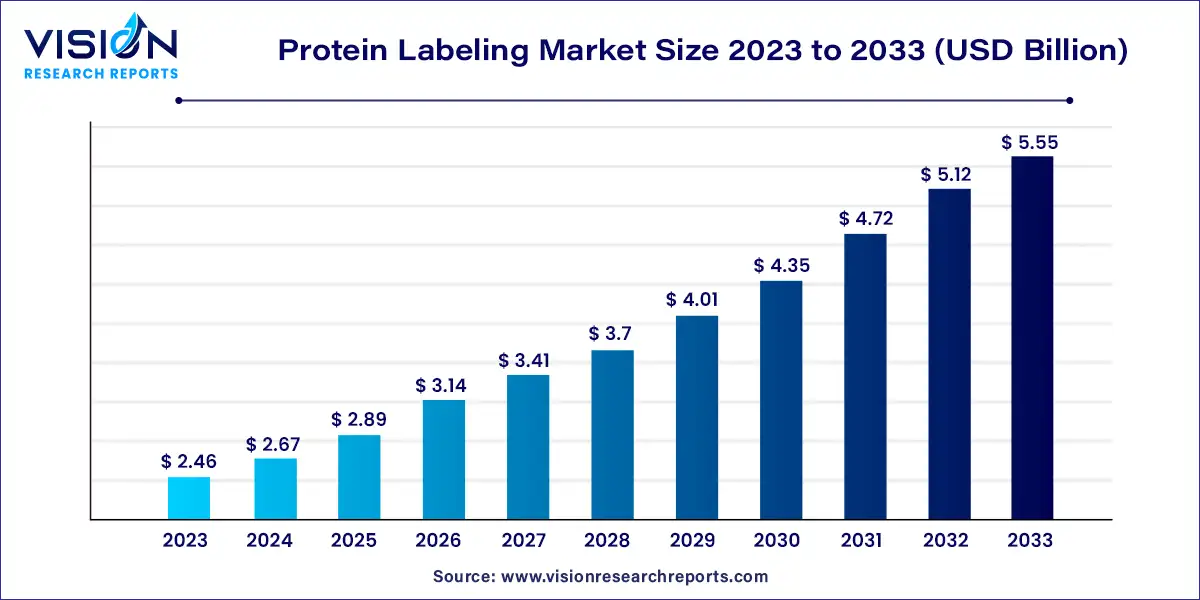The global protein labeling market size was estimated at USD 2.46 billion in 2023 and it is expected to surpass around USD 5.55 billion by 2033, poised to grow at a CAGR of 8.48% from 2024 to 2033.

Key Pointers
- North America led the market with the largest market share of 42% in 2023.
- Asia Pacific protein labeling market is anticipated to witness the fastest CAGR of 10.48% from 2024 to 2033.
- By Product, the reagents segment captured the maximum market share of 64% in 2023.
- By Product, the kits segment is anticipated to grow at the noteworthy CAGR of 9.64% from 2024 to 2033.
- By Method, the in-vitro segment held the largest market share at 71% in 2023.
- By Method, the in-vivo segment is projected to witness significant growth from 2024 to 2033.
- By Application, the immunological techniques segment contributed the largest market share of 40% in 2023.
Get a Sample@ https://www.visionresearchreports.com/report/sample/41426
Introduction to Protein Labeling
Protein labeling is a crucial technique in biochemistry that involves attaching markers or tags to proteins for visualization, purification, or quantification purposes. This process plays a pivotal role in various fields including proteomics, drug discovery, and diagnostics. Protein labeling allows researchers to track proteins within cells, understand their functions, and elucidate complex biological pathways.
Applications of Protein Labeling
Proteomics Research
In proteomics research, protein labeling facilitates the identification and characterization of proteins in complex biological samples. By labeling proteins with tags that enhance detection sensitivity, researchers can analyze protein abundance, modifications, and interactions, providing insights into disease mechanisms and therapeutic targets.
Drug Discovery and Development
Protein labeling accelerates drug discovery by enabling high-throughput screening of potential drug candidates against target proteins. By tagging proteins involved in disease pathways, researchers can assess drug efficacy, selectivity, and mechanism of action, expediting the development of novel therapeutics with improved clinical outcomes.
Diagnostic Assays
In diagnostics, protein labeling is instrumental in developing sensitive and specific assays for detecting biomarkers associated with various diseases. By conjugating proteins with diagnostic probes, clinicians can detect minute quantities of target molecules in patient samples, facilitating early disease detection and personalized treatment strategies.
Market Drivers
- Advancements in Proteomics: Continuous innovations in proteomics, including mass spectrometry and protein analysis techniques, are driving significant demand for advanced protein labeling solutions. These technologies enable researchers to accurately identify, quantify, and analyze proteins, which is crucial for understanding disease mechanisms and developing targeted therapies.
- Rise in Personalized Medicine: There is a growing shift towards personalized medicine, where treatments are tailored to individual patient profiles. Protein labeling plays a pivotal role in this paradigm by facilitating the identification of biomarkers and therapeutic targets specific to patient populations. This trend is fueling the demand for precise and sensitive protein labeling technologies.
- Expansion in Biopharmaceutical Research: The increasing focus on biopharmaceuticals, including biologics and monoclonal antibodies, is driving the need for sophisticated protein labeling techniques. These techniques are essential for characterizing therapeutic proteins, ensuring product quality, and optimizing drug development processes.
Market Challenges
- Regulatory Compliance: Stringent regulatory requirements regarding the use of labeling reagents, particularly radioactive isotopes and hazardous chemicals, pose significant challenges for market players. Compliance with safety standards and environmental regulations adds complexity and increases operational costs.
- Cost Constraints: High initial costs associated with advanced protein labeling technologies and reagents are a barrier to adoption, particularly for small research laboratories and academic institutions with limited budgets. Cost-effective alternatives and scalable solutions are needed to broaden market access and facilitate widespread adoption.
- Technological Complexity: The complexity of protein labeling techniques, such as bioorthogonal chemistry and enzymatic labeling, presents challenges in terms of implementation and standardization. Continuous innovation is required to simplify workflows, improve efficiency, and ensure reproducibility across different applications.
Market Opportunities
- Emerging Applications in Diagnostic Assays: Protein labeling technologies are increasingly being integrated into diagnostic assays for detecting biomarkers associated with diseases such as cancer, cardiovascular disorders, and infectious diseases. The development of sensitive and specific diagnostic tests represents a significant growth opportunity for market stakeholders.
- Technological Innovations: Ongoing advancements in bioorthogonal chemistry, nanoparticle-based labeling, and multiplexed labeling techniques are opening new avenues for innovation in protein labeling. These innovations enhance labeling specificity, minimize background noise, and expand the scope of applications in research and clinical diagnostics.
- Collaborative Research Initiatives: Collaborations between academic institutions, pharmaceutical companies, and biotechnology firms are fostering interdisciplinary research in protein labeling. These partnerships facilitate knowledge exchange, accelerate technology development, and drive commercialization efforts in emerging markets.
Protein Labeling Market Key Companies
- Thermo Fisher Scientific, Inc.
- Merck KGaA
- Revvity Inc.
- Promega Corporation.
- F. Hoffmann-La Roche Ltd
- LGC Ltd
- New England Biolabs.
- LI-COR, Inc.
- Danaher (Cytiva)
- Jena Bioscience GmbH
Protein Labeling Market Segmentation:
By Product
- Reagents
- Proteins
- Enzymes
- Probes/Tags
- Monoclonal Antibodies
- Other Reagents
- Kits
- Services
By Method
- In-vitro Labeling Methods
- Enzymatic Labeling
- Dye-based Labeling
- Co-translational Labeling
- Site-specific Labeling
- Nanoparticle Labeling
- Others
- In-vivo Labeling Methods
- Photoreactive Labeling
- Radioactive Labeling
- Others
By Application
- Immunological Techniques
- Cell-based Arrays
- Fluorescence Microscopy
- Protein Microarray
- Mass Spectrometry
By Region
- North America
- Europe
- Asia Pacific
- Latin America
- MEA
Buy this Premium Research Report@ https://www.visionresearchreports.com/report/checkout/41426
You can place an order or ask any questions, please feel free to contact sales@visionresearchreports.com| +1 650-460-3308
